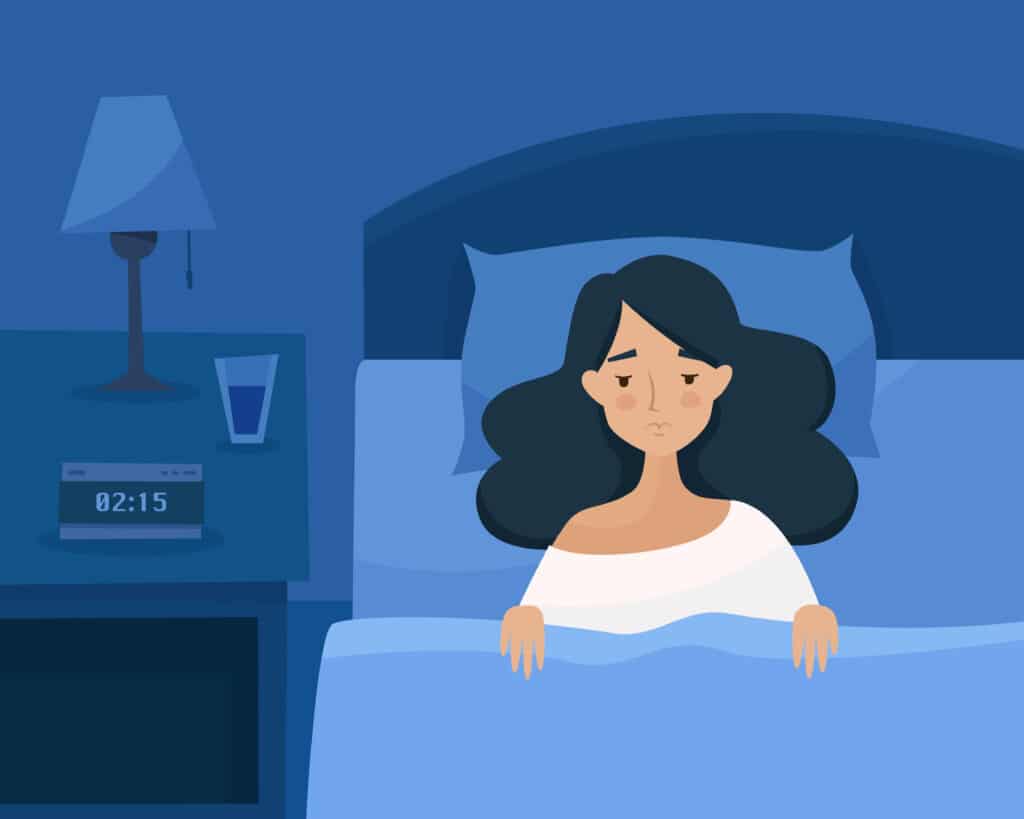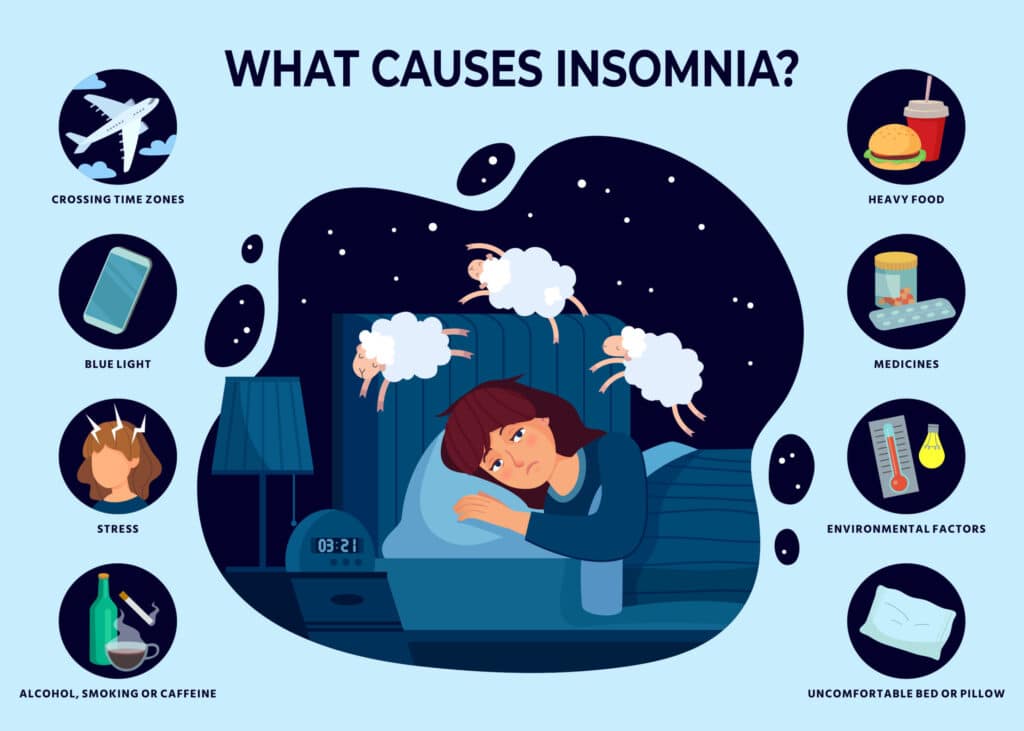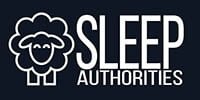
Our insomnia test is designed to help those who are having trouble sleeping determine the severity of their sleep disorder. Answer the 7 insomnia related questions in our test below to determine your sleep score.
This test uses the questions and scoring from the Insomnia Severity Index.
The Test
About Our Insomnia Sleep Test
Many people have trouble sleeping but when does that trouble become clinical insomnia?
We used the questions from the Insomnia Severity Index questionnaire to create an easy to use insomnia test that will give you an idea of the extent of your potential sleep disorder.
Medical Disclaimer
*The result of this insomnia quiz is not a medical diagnosis and is not designed to provide medical advice, treat, cure, or prevent any disease or condition. Any and all health concerns should be directed to a doctor or other healthcare professional.
Signs of Insomnia
- Problems falling asleep at night
- Waking up multiple times during the night
- Frequently waking up too early
- Not feeling well-rested in the morning
- Daytime fatigue or sleepiness
- Mood swings
- Irritability
- Tendency toward depression or anxiety
- Difficulty paying attention and focusing
- Memory problems
- Anxiety about bedtime
What Causes Insomnia?
Why do people get insomnia? Well, it depends based on the individual. For example, acute insomnia may be the result of a stressful life experience; sleep problems may disappear once the period of stress ends.

Chronic primary sufferers, though, typically have three factors in common. Based on the widely accepted Spielman model, there are three P’s that place someone at risk for developing insomnia.
- Predisposition
- Precipitating Trigger
- Perpetuating Poor Sleep Hygiene
These factors include predisposition (such as genetics or specific personality traits), a precipitating trigger (usually whatever caused the acute episode), and perpetuating poor sleep hygiene habits and behaviors first developed in response to the acute episode. In other words, some people are just more predisposed to sleeplessness than others.
Furthermore, those who suffer from an acute episode may form poor coping strategies to deal with this initial sleeplessness. Then, these strategies become habitual. This in turn reinforces poor sleep habits (sleep hygiene) that make it harder and harder to sleep as time goes on.
Who is at Greater Risk of Getting Insomnia?
So, just who is at the greatest risk for developing insomnia?
Those at higher risk include:
- Elderly people
- Women
- African Americans
- Long-distance travelers
- Sedentary individuals
- Lower-income households
- Those who work night shifts or inconsistent shifts
How to Cure Insomnia – What is the Standard Treatment?
Treatment for insomnia is dependent upon the severity of your particular case and its underlying causes.
Sleep Hygiene Improvements
For milder cases, you may be able to cure your insomnia by improving your sleep hygiene practices. This involves altering your sleep habits and environment to instill a healthy routine that promotes good sleep. Our sleep hygiene section offers actionable tips to improve your sleep practices.
Cognitive Behavioral Therapy for Insomnia
CBT stands for cognitive behavioral therapy. It is a form of talk therapy that involves a patient recognizing thought patterns, habits, and behaviors, then challenging them. This challenge involves changing unwanted or unhelpful behaviors, which can mean learning coping strategies as well as learning how to better manage emotions.
So, CBT rests on the idea that thoughts, behavior, and feelings are all closely related. That means better managing all three can result in an improved sense of wellbeing.
So What is CBT-I?
CBT-I stands for cognitive behavioral therapy for insomnia. It follows the same basic principles as standard CBT; namely, that thoughts, feelings, and behavior all intertwine. However, it focuses specifically on aspects of life that affect sleep.
In other words, CBT-I forces patients to reconsider their thought patterns, emotions, and habits in relation to sleep. The goal, of course, is to improve rest time and/or quality.
Treatment for Severe Cases of Insomnia
For severe cases you should seek help through your doctor, they may refer you to an Accredited Sleep Center run by the American Academy of Sleep Medicine.
Here is a tool that shows you the closest Accredited Sleep Center to you
The results page will show you the sleep center, the sleep disorder that they test for or treat, their address and contact information, and the distance from the location that you input.
Alternatively, the AASM has now set up a dedicated telemedicine platform for accredited sleep centers that may be able to help you online.
Take a look at AASM SleepTM Select here.
Dangers of Untreated Insomnia
Sleep is incredibly vital to overall health and wellbeing. When sleep is disrupted long-term, it can lead to some significant health risks, including high blood pressure and diabetes. In some rare cases, people may eventually not be able to sleep at all, which ultimately leads to death. Called fatal familial insomnia, this condition is genetic. Again, though, this specific form of sleeplessness is incredibly rare.
However, someone’s physical health isn’t all that suffers from sleep deprivation; mental health can decline, too. Those with insomnia, for instance, are at increased risk for developing conditions like depression. In fact, those who recover from all symptoms of depression except for insomnia are much more likely to relapse than those who can sleep well. If someone’s condition persists, insomnia can also greatly increase suicide risk.
What To Do Now That You Have The Results of Your Insomnia Test?
So you took the test, got your results but now what? Find the section that your score falls into and use the resources provided to try to cure your insomnia and get back to sleeping in a healthy way.
If You Scored 0-7 = No clinically significant insomnia
If you fit in the ‘No clinically significant insomnia’ category, you may want to:
- Visit our ‘Sleep Better’ section for suggestions for all types of sleepers
- Read up on general sleep information
- Learn how lifestyle practices affect sleep
If You Scored 8-14 = Subthreshold insomnia
If you fit in the ‘Sub-threshold significant insomnia’ category, you may want to:
- Contact your healthcare provider
- Visit our ‘Sleep Better’ section for suggestions for all types of sleepers
- Read up on general sleep information
- Learn how lifestyle practices affect sleep
If You Scored 15-21 = Clinical insomnia (moderate severity)
If you fit into the ‘Clinical insomnia (moderate severity)’ category, you may want to:
- Contact your healthcare provider
- Find an Accredited Sleep Center
- Contact a teleheath sleep professional
If You Scored 22-28 = Clinical insomnia (severe)
If you fit into the ‘Clinical insomnia (severe)’ category, you may want to:
- Contact your healthcare provider
- Find an Accredited Sleep Center
- Contact a Teleheath Sleep Professional
Medical Disclaimer
This article is for reference purposes only. It should not replace the advice of a licensed professional. Do not use this article to diagnose, treat, cure, or prevent any disease or condition. Any and all health concerns should be directed to a doctor or other healthcare professional.
